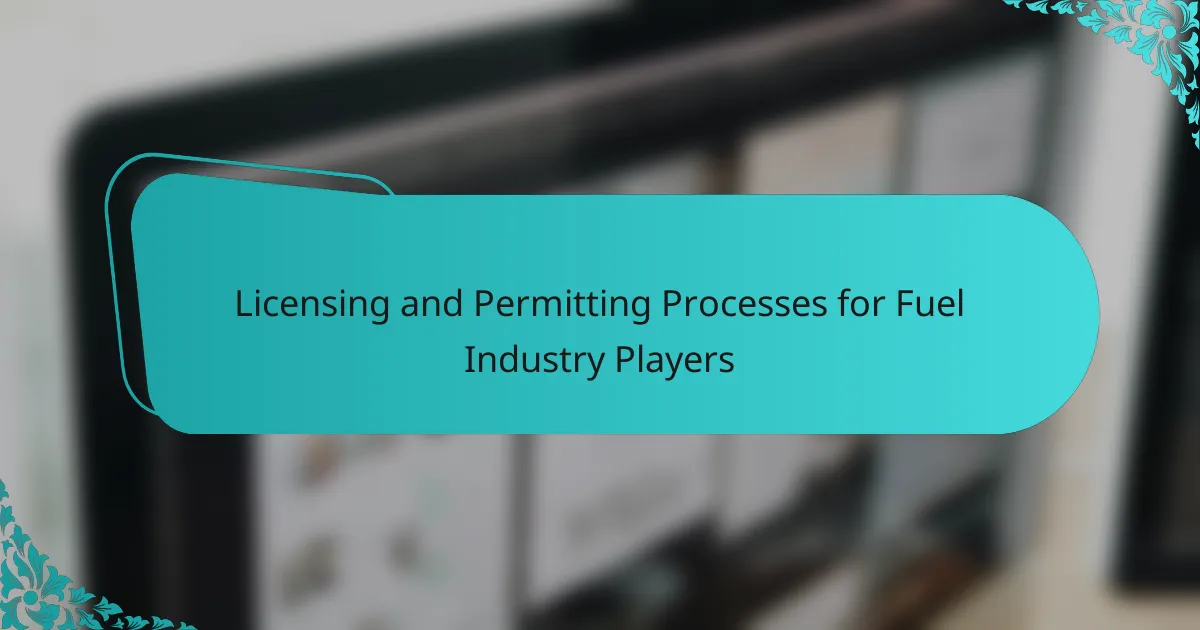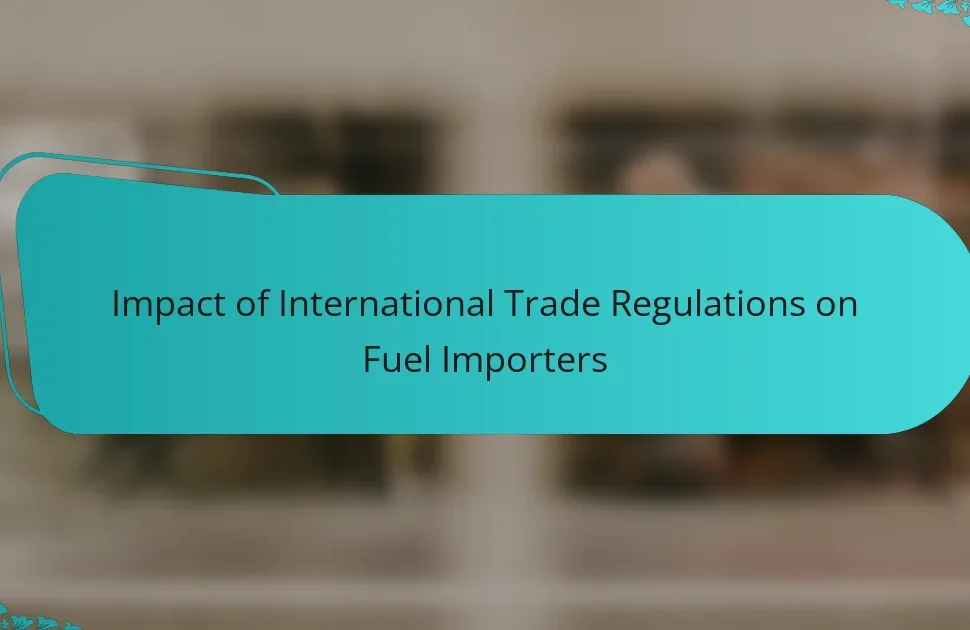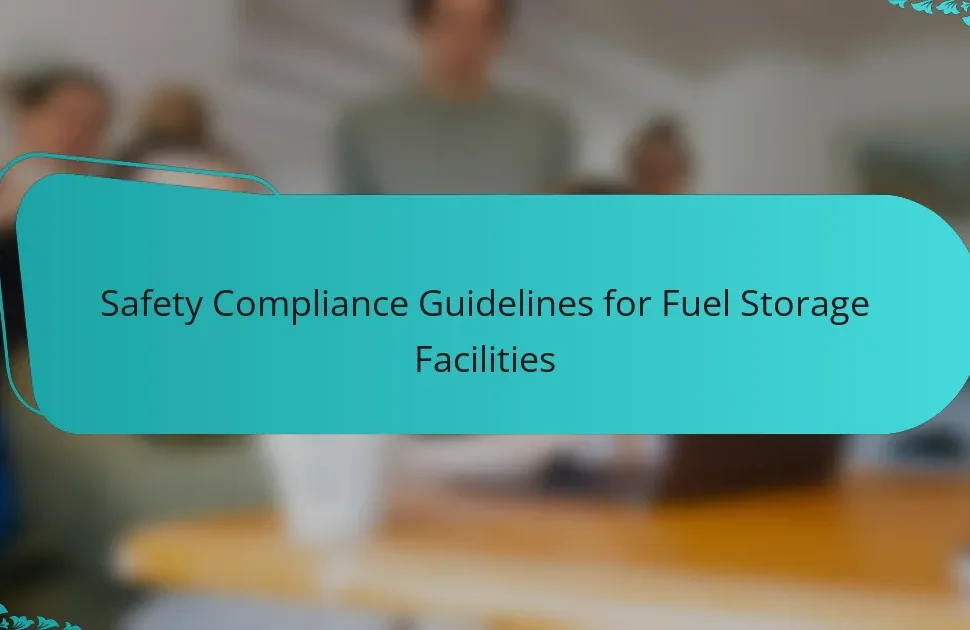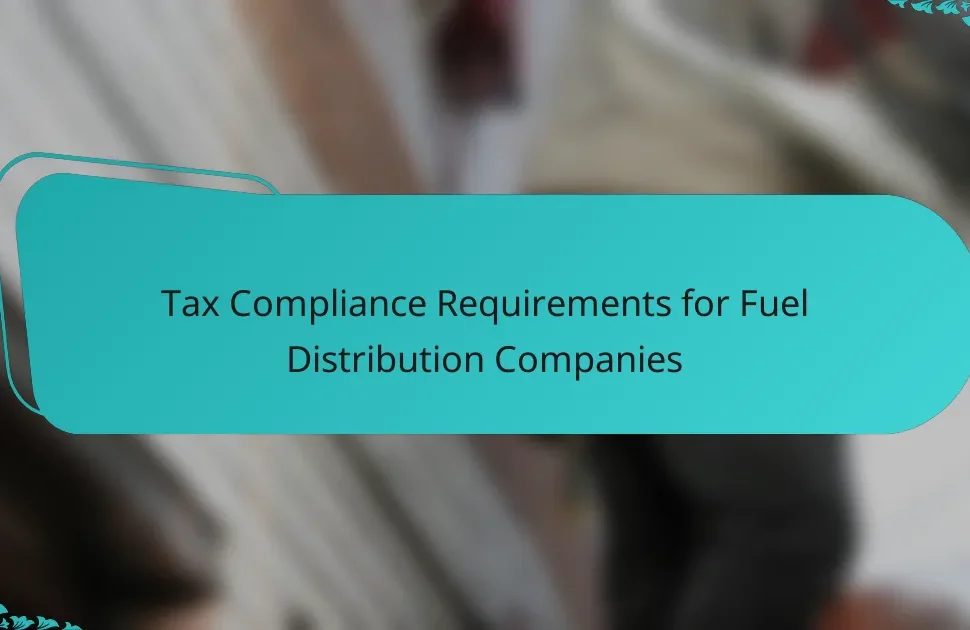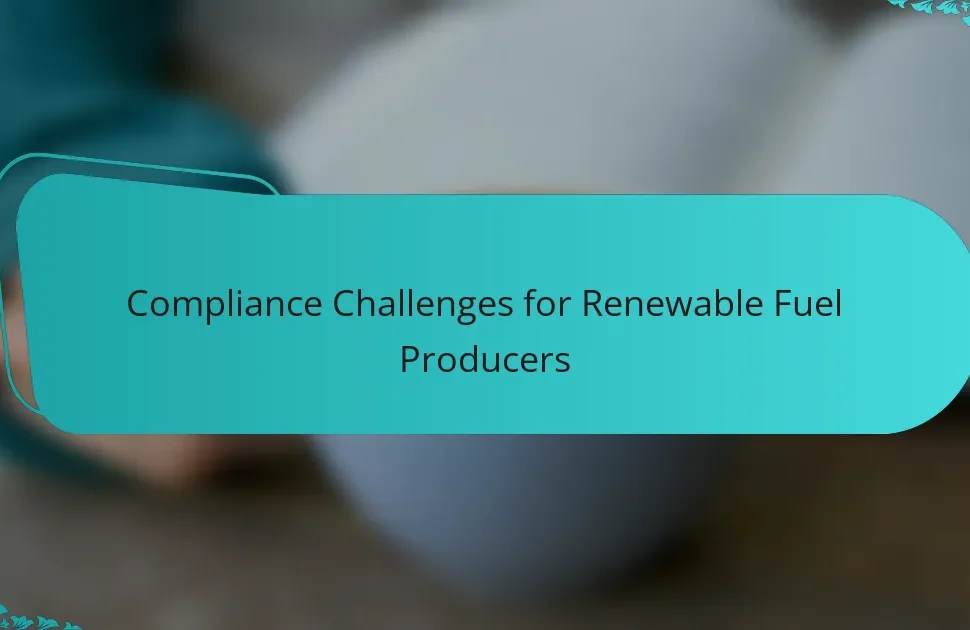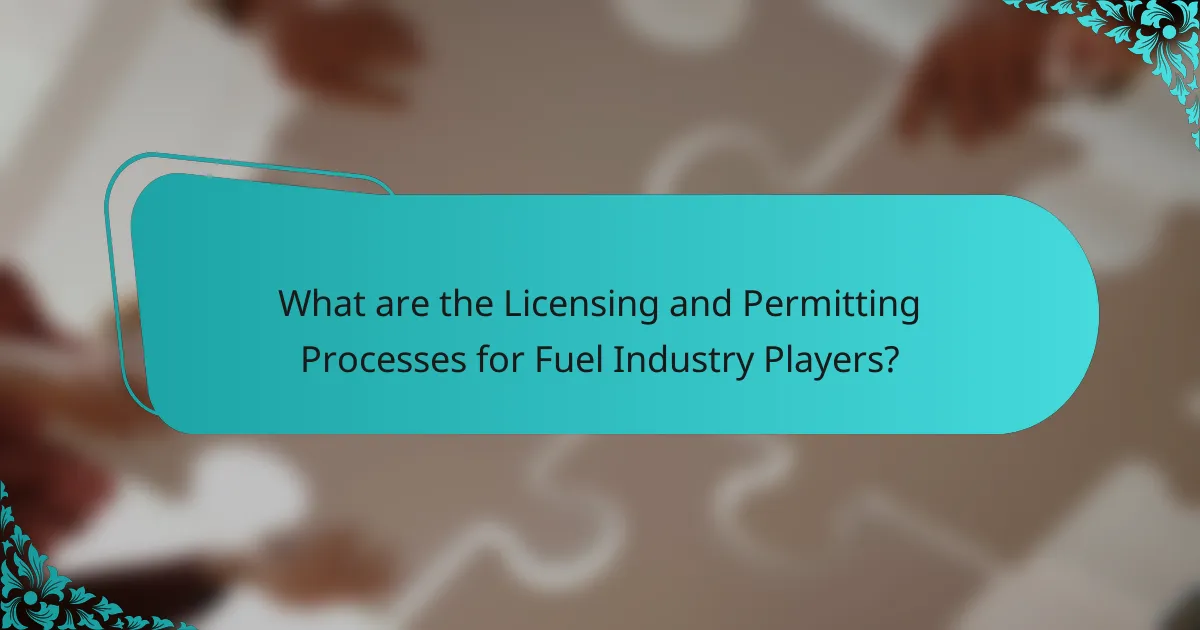
What are the Licensing and Permitting Processes for Fuel Industry Players?
The licensing and permitting processes for fuel industry players involve multiple regulatory steps. First, companies must obtain a business license from local authorities. This license ensures compliance with local laws and regulations. Next, environmental permits are required to assess the potential impact on ecosystems. These permits are often issued by state or federal environmental agencies. Additionally, fuel industry players must secure operational permits for specific activities, such as drilling or refining. These permits ensure adherence to safety and operational standards. Compliance with zoning laws is also crucial, as it determines where fuel-related activities can occur. Finally, ongoing reporting and renewals are necessary to maintain compliance with all permits and licenses.
How do licensing and permitting processes impact fuel industry operations?
Licensing and permitting processes significantly impact fuel industry operations by establishing regulatory compliance and operational boundaries. These processes ensure that companies adhere to safety, environmental, and industry standards. For example, obtaining permits can dictate the timeline for project initiation and completion. Delays in licensing can lead to increased operational costs and project postponements. Additionally, stringent regulations may limit the types of fuel that can be produced or distributed. This can affect market competitiveness and innovation within the industry. Companies must allocate resources for compliance, which can divert funds from other operational areas. Overall, licensing and permitting processes play a crucial role in shaping the operational landscape of the fuel industry.
What are the key regulatory bodies involved in these processes?
The key regulatory bodies involved in licensing and permitting processes for fuel industry players include the Environmental Protection Agency (EPA), the Department of Energy (DOE), and the Federal Energy Regulatory Commission (FERC). The EPA oversees environmental regulations and ensures compliance with environmental standards. The DOE manages energy policies and regulations, facilitating energy production and distribution. FERC regulates interstate transmission of electricity, natural gas, and oil, ensuring fair pricing and access. Each of these bodies plays a crucial role in maintaining industry standards and protecting public interests.
How do these processes ensure safety and compliance in the fuel industry?
Licensing and permitting processes ensure safety and compliance in the fuel industry by establishing regulatory standards. These processes require companies to adhere to safety protocols during fuel production and distribution. Compliance with these standards minimizes risks associated with accidents and environmental hazards. Regular inspections and audits are mandated to verify adherence to safety regulations. Failure to comply can result in penalties, including fines and license revocation. Historical data shows that strict licensing reduces incidents in the fuel sector. For example, the U.S. Environmental Protection Agency reported a decrease in oil spills due to stringent permitting requirements. This demonstrates that effective processes enhance overall safety and regulatory compliance in the industry.
What types of licenses and permits are required for fuel industry players?
Fuel industry players require several types of licenses and permits to operate legally. These include a fuel distributor license, which allows companies to sell fuel to retailers. A storage tank permit is necessary for facilities that store fuel, ensuring compliance with safety regulations. Additionally, a transportation permit is required for companies that transport fuel, ensuring adherence to environmental and safety standards. Environmental permits may also be needed to comply with local, state, or federal regulations regarding emissions and waste management. Each of these licenses and permits varies by jurisdiction and must be obtained from relevant regulatory authorities. Compliance with these requirements is crucial for legal operation in the fuel industry.
What are the specific licenses required for fuel production?
Fuel production requires several specific licenses. These licenses vary by country and region. Common licenses include environmental permits, operational permits, and safety certifications. Environmental permits ensure compliance with regulations protecting air and water quality. Operational permits are necessary for the actual production and distribution of fuel. Safety certifications verify that facilities meet health and safety standards. Additionally, some regions may require specific licenses for handling hazardous materials. Compliance with local, state, and federal regulations is essential for legal operation in the fuel production industry.
What permits are necessary for fuel distribution and transportation?
Fuel distribution and transportation require various permits. These include a federal hazardous materials transportation permit. States may also require specific permits for fuel transport. Local jurisdictions often impose additional regulations. A motor carrier permit is typically necessary for commercial transport. Environmental permits may be needed depending on the location and type of fuel. Compliance with the Department of Transportation regulations is essential. Each permit ensures safety and regulatory adherence in fuel distribution activities.
Why is understanding the licensing and permitting process crucial for fuel industry players?
Understanding the licensing and permitting process is crucial for fuel industry players because it ensures compliance with legal regulations. Compliance helps avoid costly fines and legal issues. The fuel industry is heavily regulated to protect public health and the environment. Failure to adhere to these regulations can lead to operational shutdowns. Moreover, obtaining the necessary permits is often a lengthy process. Delays can hinder project timelines and increase costs. Additionally, understanding this process aids in strategic planning and resource allocation. Knowledge of local, state, and federal requirements is essential for successful operations.
What risks do companies face without proper licensing?
Companies face significant legal and financial risks without proper licensing. They may incur hefty fines for operating illegally. Regulatory bodies can impose penalties that reach thousands of dollars. Additionally, companies risk losing their ability to operate in their industry. This can lead to a loss of reputation and customer trust. Without licensing, companies also face potential lawsuits from competitors or consumers. These legal challenges can result in costly settlements or judgments. Furthermore, unlicensed operations can lead to increased scrutiny from regulators. This can complicate future licensing efforts and business operations.
How can compliance with these processes enhance business reputation?
Compliance with licensing and permitting processes enhances business reputation by demonstrating accountability and adherence to regulations. This compliance builds trust with stakeholders, including customers, regulators, and the community. A strong reputation for compliance can lead to increased customer loyalty and positive word-of-mouth. Furthermore, businesses that comply are less likely to face legal issues or fines. For instance, companies that consistently meet regulatory standards often gain recognition and certifications that bolster their credibility. Research from the Institute of Business Ethics indicates that ethical compliance can significantly improve stakeholder perceptions, further reinforcing a positive business image.
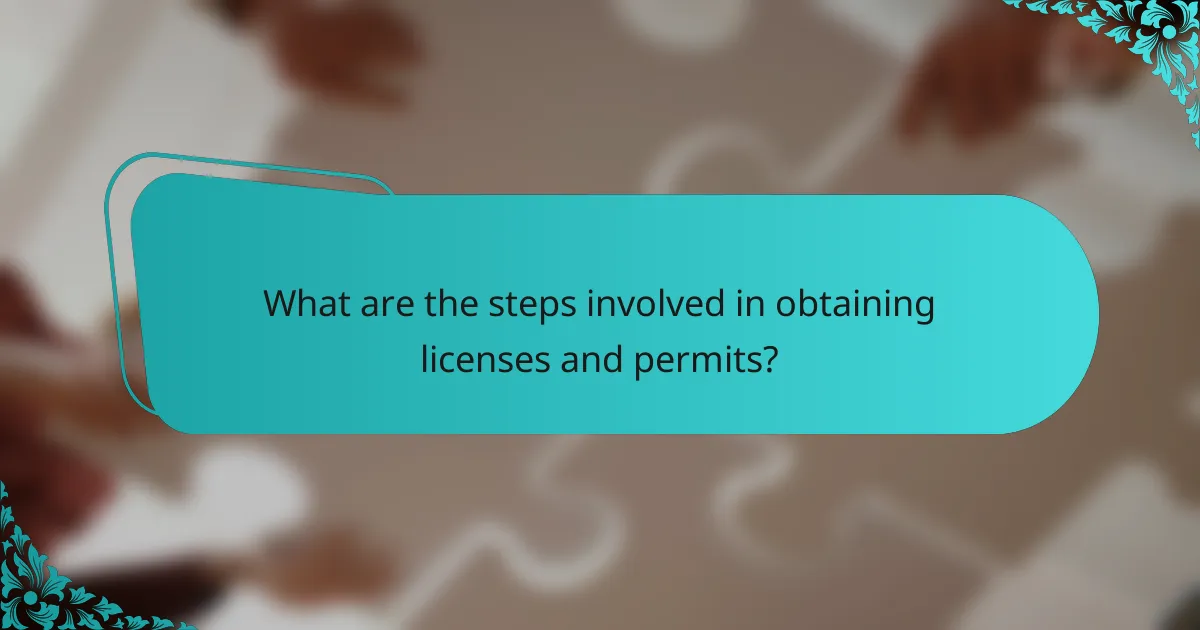
What are the steps involved in obtaining licenses and permits?
The steps involved in obtaining licenses and permits include researching requirements, completing applications, and submitting documentation. First, applicants must identify the specific licenses and permits needed for their activities. This often involves reviewing local, state, and federal regulations. Next, applicants fill out the necessary application forms accurately. They may need to provide supporting documents such as business plans, safety protocols, and financial statements. After preparing the application, applicants submit it to the appropriate regulatory authority. This submission may require paying applicable fees. Following submission, applicants may need to attend interviews or hearings. Finally, applicants await approval or denial of their applications, which may take several weeks or months.
How does the application process for licenses and permits work?
The application process for licenses and permits involves several key steps. First, applicants must gather necessary documentation, including identification and proof of business operations. Next, they submit the application to the relevant regulatory authority. This submission often includes fees that vary by jurisdiction.
Once submitted, the authority reviews the application for compliance with regulations. This review process can take several weeks to months, depending on the complexity of the application.
After review, the authority may request additional information or clarification from the applicant. If the application meets all requirements, a license or permit is granted.
Successful applicants receive their licenses or permits, allowing them to operate legally. According to the U.S. Small Business Administration, compliance with local regulations is crucial for business operations.
What documentation is typically required during the application process?
The documentation typically required during the application process for licensing and permitting in the fuel industry includes a completed application form. Applicants must also provide proof of identity, such as a government-issued ID. Financial statements or proof of financial stability are often necessary to demonstrate the ability to operate. Environmental assessments may be required to ensure compliance with regulations. Insurance certificates are usually needed to show coverage for potential liabilities. Additionally, applicants may need to submit business plans outlining operational strategies. Background checks may also be part of the process to assess the applicant’s history. Each jurisdiction may have specific requirements, so it is essential to verify with local authorities.
How long does the approval process usually take?
The approval process usually takes between 30 to 120 days. This duration depends on the specific licensing authority and the complexity of the application. Some applications may require additional documentation or public hearings, which can extend the timeline. For example, environmental permits often take longer due to comprehensive reviews. Regulatory agencies typically aim to process applications efficiently, but delays can occur. Factors such as applicant responsiveness and the completeness of submitted materials also influence the approval time.
What challenges do fuel industry players face during the licensing process?
Fuel industry players face several challenges during the licensing process. These challenges include navigating complex regulatory frameworks. Different regions have varying requirements that can complicate compliance. Delays in obtaining necessary permits are also common. These delays can significantly impact project timelines and costs. Additionally, the high costs associated with licensing can be a barrier for smaller companies. Environmental assessments required for licenses can be time-consuming and costly. Stakeholder engagement and public opposition can further complicate the licensing process. All these factors contribute to the overall difficulty of securing licenses in the fuel industry.
How can companies navigate bureaucratic hurdles effectively?
Companies can navigate bureaucratic hurdles effectively by establishing clear communication channels with regulatory bodies. This involves understanding the specific requirements and timelines for licensing and permits. Companies should also engage legal and compliance experts to interpret regulations accurately. Building relationships with key stakeholders can facilitate smoother interactions. Additionally, utilizing technology can streamline documentation and submission processes. Regular training for staff on regulatory updates is crucial. Keeping detailed records of all communications and submissions aids in transparency and accountability. Following these strategies can significantly reduce delays and improve compliance outcomes.
What common mistakes should applicants avoid?
Applicants should avoid submitting incomplete applications. Incomplete applications can lead to delays or rejections. Additionally, failing to provide accurate information is a common mistake. Misrepresentation can result in legal consequences. Not understanding the specific requirements of the licensing process is another error. Each jurisdiction may have different regulations. Ignoring deadlines can also hinder the application process. Timely submission is crucial for approval. Lastly, neglecting to follow up on the application status can lead to missed opportunities. Regular communication with the licensing authority is advisable.
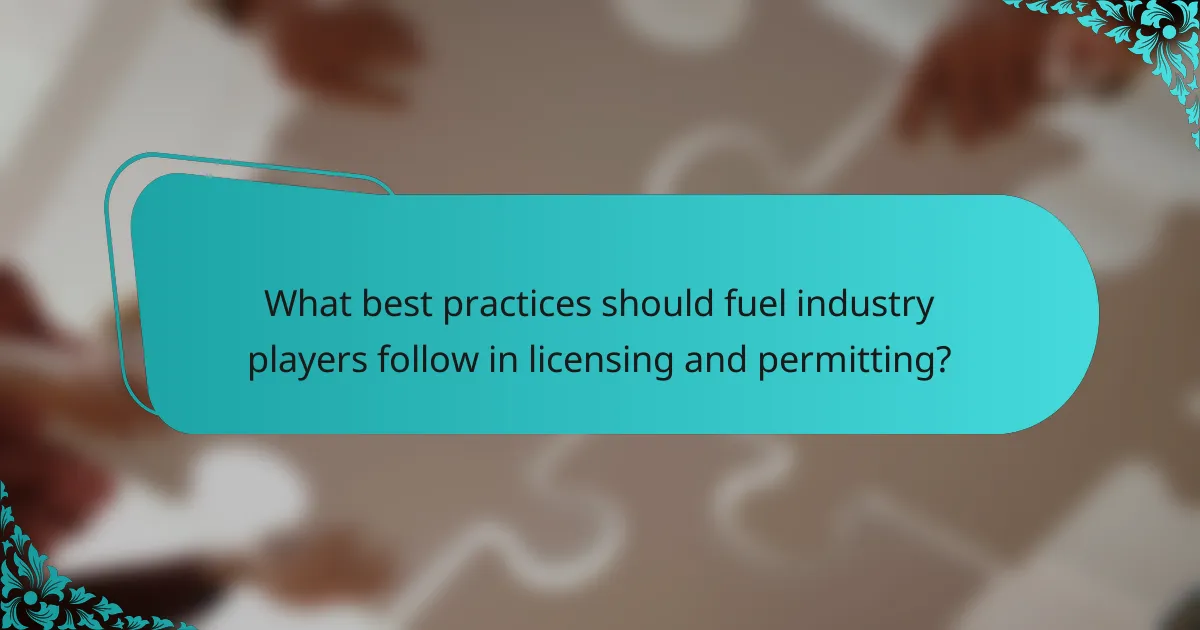
What best practices should fuel industry players follow in licensing and permitting?
Fuel industry players should follow best practices that ensure compliance and efficiency in licensing and permitting. First, they must conduct thorough research on local, state, and federal regulations. Understanding these regulations is crucial for obtaining necessary permits. Next, establishing a clear timeline for the licensing process helps manage expectations and resources.
Additionally, maintaining open communication with regulatory agencies fosters transparency and trust. Engaging with stakeholders early in the process can identify potential issues. Implementing a robust documentation system ensures that all required paperwork is organized and accessible.
Regular training for staff on compliance requirements is essential to keep everyone informed of changes in regulations. Finally, reviewing and updating practices periodically can help adapt to evolving legal landscapes. These practices collectively enhance the likelihood of successful licensing and permitting outcomes.
How can companies ensure timely compliance with licensing requirements?
Companies can ensure timely compliance with licensing requirements by implementing a structured compliance management system. This system should include regular audits of licensing obligations. It is essential to maintain an updated calendar of all licensing deadlines. Assigning a dedicated compliance officer can help oversee licensing activities. Training staff on licensing requirements is also crucial. Utilizing compliance software can streamline tracking and reporting processes. Regular communication with regulatory bodies can provide updates on any changes. Documentation of all compliance activities is necessary for accountability.
What resources are available for staying updated on regulatory changes?
Government websites provide official updates on regulatory changes. Agencies like the Environmental Protection Agency (EPA) and the Department of Energy (DOE) publish relevant information. Industry associations also offer resources. Organizations such as the American Petroleum Institute (API) disseminate news on regulatory developments. Professional journals publish articles on regulatory changes affecting the fuel industry. Subscribing to newsletters from these sources ensures timely updates. Attending industry conferences can also provide insights into upcoming regulations. These resources collectively help stakeholders stay informed about regulatory changes.
How can industry associations assist in the licensing process?
Industry associations can assist in the licensing process by providing guidance and resources to fuel industry players. They offer expertise on regulatory requirements and best practices. Associations often create educational materials to help members understand the licensing landscape. They may also provide templates and toolkits for application submissions. Additionally, industry associations advocate on behalf of their members with regulatory bodies. This can lead to streamlined processes and reduced barriers. Furthermore, they facilitate networking opportunities that can connect members with experienced professionals. These connections can enhance the chances of successful licensing.
What strategies can fuel industry players implement for successful licensing?
Fuel industry players can implement several strategies for successful licensing. First, they should conduct thorough research on regulatory requirements. Understanding local, state, and federal regulations is crucial for compliance. Second, establishing strong relationships with regulatory agencies can facilitate smoother processes. Engaging in open communication helps address concerns early. Third, investing in compliance training for employees ensures everyone understands their responsibilities. This reduces errors in applications and operations. Fourth, utilizing technology can streamline documentation and tracking of licensing processes. Software solutions can help manage deadlines and submissions effectively. Lastly, seeking legal advice can prevent costly mistakes. Legal experts can provide insights on navigating complex regulations. These strategies collectively enhance the likelihood of obtaining and maintaining necessary licenses in the fuel industry.
How can leveraging technology streamline the licensing process?
Leveraging technology can significantly streamline the licensing process by automating repetitive tasks. Automation reduces human error and speeds up application reviews. Digital platforms allow for real-time tracking of applications and statuses. This transparency improves communication between applicants and licensing authorities. Data analytics can identify bottlenecks in the process, enabling targeted improvements. Cloud storage facilitates easy access to documents and information. Electronic signatures simplify the approval process, eliminating the need for physical paperwork. According to a study by the National Association of Secretaries of State, technology can reduce processing times by up to 50%.
What role does stakeholder engagement play in obtaining permits?
Stakeholder engagement is critical in obtaining permits. It ensures that the concerns of affected parties are addressed. Engaging stakeholders fosters transparency and trust. This process can lead to smoother permit approvals. Effective communication with stakeholders can identify potential issues early. It also helps in building community support for projects. Regulatory agencies often require evidence of stakeholder engagement. Failure to engage can result in delays or permit denials.
What tips can fuel industry players follow to maintain compliance post-licensing?
Fuel industry players should implement a comprehensive compliance program post-licensing. Regularly review and update internal policies to align with regulatory changes. Conduct training sessions for employees on compliance standards and practices. Maintain accurate records of operations, safety protocols, and environmental measures. Engage with regulatory bodies to stay informed about compliance requirements. Schedule routine audits to assess adherence to compliance measures. Utilize compliance management software to streamline processes and ensure documentation is up-to-date. Establish a clear communication channel for reporting compliance issues or concerns within the organization.
The main entity of this article is the licensing and permitting processes for fuel industry players. The article outlines the multi-step regulatory framework that companies must navigate to obtain necessary licenses and permits, including business licenses, environmental permits, and operational permits. It emphasizes the impact of these processes on operational efficiency, safety compliance, and market competitiveness, while detailing the roles of key regulatory bodies such as the EPA and DOE. Additionally, the article provides insights into the challenges faced during the licensing process, best practices for compliance, and the importance of stakeholder engagement in facilitating successful permit acquisition.
